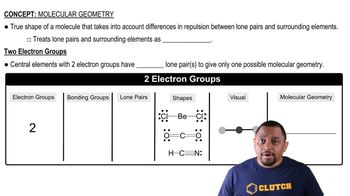Each ball-and-stick model shows the electron and molecular geometry of a generic molecule. Explain what is wrong with each molecular geometry and provide the correct molecular geometry, given the number of lone pairs and bonding groups on the central atom. (c)
Ch.10 - Chemical Bonding II: Molecular Shapes & Valence Bond Theory
All textbooks Tro 4th Edition
Tro 4th Edition Ch.10 - Chemical Bonding II: Molecular Shapes & Valence Bond Theory
Ch.10 - Chemical Bonding II: Molecular Shapes & Valence Bond Theory Problem 47
Problem 47
 Tro 4th Edition
Tro 4th Edition Ch.10 - Chemical Bonding II: Molecular Shapes & Valence Bond Theory
Ch.10 - Chemical Bonding II: Molecular Shapes & Valence Bond Theory Problem 47
Problem 47Chapter 10, Problem 47
Explain why CO2 and CCl4 are both nonpolar even though they contain polar bonds.
 Verified step by step guidance
Verified step by step guidance1
Identify the molecular geometry of CO<sub>2</sub>. Carbon dioxide has a linear molecular shape with the carbon atom in the center and oxygen atoms at both ends. The bond angles are 180 degrees.
Analyze the molecular geometry of CCl<sub>4</sub>. Carbon tetrachloride has a tetrahedral shape with the carbon atom in the center and four chlorine atoms at the corners. The bond angles are approximately 109.5 degrees.
Understand the concept of bond polarity. Both CO<sub>2</sub> and CCl<sub>4</sub> have polar bonds. In CO<sub>2</sub>, the difference in electronegativity between carbon and oxygen creates polar bonds. In CCl<sub>4</sub>, the difference in electronegativity between carbon and chlorine also results in polar bonds.
Examine the symmetry of the molecules. The symmetry of a molecule plays a crucial role in determining its overall polarity. In CO<sub>2</sub>, the linear shape and equal bond polarities pointing in opposite directions cancel each other out, resulting in a nonpolar molecule. In CCl<sub>4</sub>, the symmetrical tetrahedral shape with equal bond polarities directed toward the corners of a regular tetrahedron also results in cancellation of dipole moments, making the molecule nonpolar.
Conclude that despite containing polar bonds, the overall molecular polarity of CO<sub>2</sub> and CCl<sub>4</sub> is determined by their symmetrical geometric shapes, which allow the dipole moments to cancel out, resulting in nonpolar molecules.

Verified Solution
Video duration:
3mWas this helpful?
Key Concepts
Here are the essential concepts you must grasp in order to answer the question correctly.
Polar and Nonpolar Bonds
A polar bond occurs when there is a significant difference in electronegativity between the two atoms involved, leading to an uneven distribution of electron density. This results in a dipole moment, where one end of the bond is slightly negative and the other slightly positive. Nonpolar bonds, on the other hand, occur between atoms with similar electronegativities, resulting in an even distribution of electron density.
Recommended video:
Guided course

Molecular Polarity
Molecular Geometry
The shape of a molecule, determined by the arrangement of its atoms and the angles between bonds, plays a crucial role in its overall polarity. Even if a molecule contains polar bonds, its geometry can lead to a cancellation of dipole moments. For example, symmetrical molecules like CO2 and CCl4 have their polar bonds arranged in such a way that the dipoles cancel each other out, resulting in a nonpolar molecule.
Recommended video:
Guided course

Molecular Geometry with Two Electron Groups
Dipole Moment Cancellation
Dipole moment cancellation occurs when the individual dipole moments of polar bonds in a molecule are oriented in opposite directions and are equal in magnitude. This results in a net dipole moment of zero, making the molecule nonpolar. In CO2, the linear arrangement allows the dipoles to cancel, while in CCl4, the tetrahedral shape achieves the same effect, despite the presence of polar C-Cl bonds.
Recommended video:
Guided course

Dipole Moment
Related Practice
Textbook Question
936
views
Textbook Question
Determine the geometry about each interior atom in each molecule and sketch the molecule. (Skeletal structure is indicated in parentheses.) c. H2O2 (HOOH)
968
views
Textbook Question
Determine the geometry about each interior atom in each molecule and sketch the molecule. (Skeletal structure is indicated in parentheses.) c. NH2CO2H (H2NCOOH both O atoms attached to C)
1111
views
Textbook Question
CH3F is a polar molecule, even though the tetrahedral geometry often leads to nonpolar molecules. Explain.
4481
views
Textbook Question
Determine whether each molecule in Exercise 35 is polar or nonpolar. a. PF3 b. SBr2 c. CHCl3 d. CS2
736
views
Textbook Question
Determine whether each molecule in Exercise 36 is polar or nonpolar. a. CF4 b. NF3 c. OF2 d. H2S
1825
views